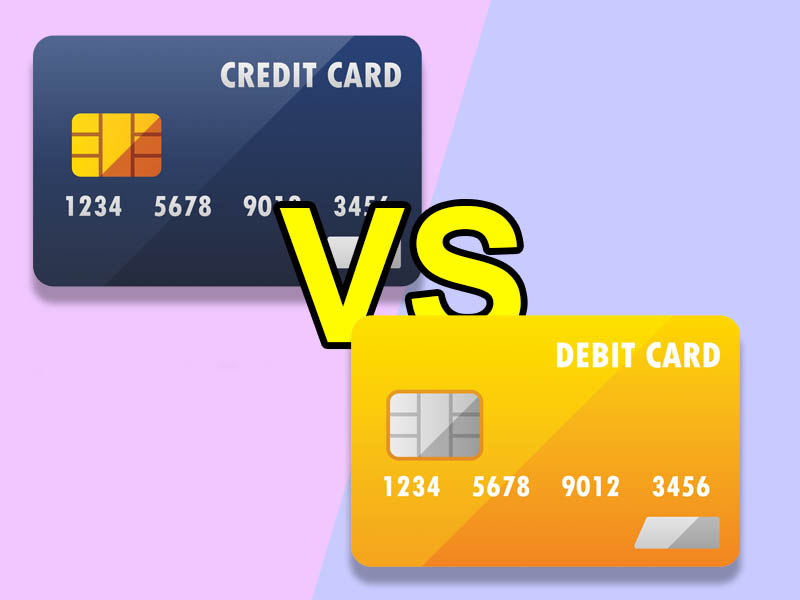These days payments are trending away from cash more than ever before. Most people swipe, insert, tap or hold up a phone, to pay through a little piece of plastic (or metal) known as the credit card. Although most people use the term credit card to refer to all card payments, there are, as you probably know, two categories of cards on offer: credit cards and debit cards. Whether you are using a credit card or debit card, can make a big difference in some cases, and here we will explain them all:
The Basics
Credit cards allow you to borrow money, up to a pre-set credit limit, and pay it off at the end of the month. If you do not pay back the full amount and only pay what is called the minimum payment, you will get charged interest on the balance left on the card at a rate of between 10% and 30% depending on the card. The interest rate on credit cards is high compared to other types of loans.
With debit cards, on the other hand, when you pay for something the money comes straight out of your bank account. If there is no money in your account the card will be either declined or, depending on the arrangement you have with your bank, they may allow your account to go overdrawn, usually incurring a fee.
There is another type of cards called “charge cards” where you borrow money but you have to pay off the balance in full every month. A feature of charge cards is that they have no pre-set spending limit, although they will still get declined if your spending is unusually high. For the purposes of this article, when we mention credit cards, we will include charge cards in the definition.

Rewards
Many credit cards earn rewards such as cash back, transferable points or frequent flyer miles. These rewards are worked out based on your spending and sometimes have bonus categories e.g. 2x points per dollar spent on travel or 5% cash back on spending in a certain category. You can use these rewards to travel for free, or in the case of cash back to purchase whatever you want in any store that accepts your currency. Some credit cards will also offer a welcome bonus for spending a certain amount in the first three months. The value of welcome bonuses can range from around $150 to $1000 USD.
Debit cards on the other hand (apart from a few exceptions) do not earn any kind of rewards on spending. The ones that do offer some form of rewards will usually be limited to 1% cash back on purchases, with no bonus categories or welcome bonuses. An example of a debit card that does offer rewards would be the Discover Cash Back Debit, that offers 1% cash back on the first $3000 in purchases every month.

Benefits
Many credit cards also come with benefits like travel insurance, car rental insurance, or airport lounge access, debit cards on the other hand typically do not. Premium cards like The Platinum Card® from American Express will even get you into airport lounges for free. There are a few debit cards that have some useful features that would count as a benefit like the Charles Schwab debit card that waives all ATM fees, but these benefits are small compared with what credit cards offer.
Annual Fees
Most debit cards don’t charge an annual fee, unless the bank account that the debit card is connected to charges an annual or monthly fee. Often bank accounts will waive fees for people who either maintain a certain balance at all times or receive direct deposits of a certain amount every month.
Many credit cards, however, do charge annual fees and these fees can range from $95 all the way up to $550 for some of the most common consumer credit cards. In the case of high annual fee premium cards, the issuers will often offer certain credits that the cardmember can use to lower the burden of the annual fee, for example the Platinum Card from American Express offers an up to $200 Uber credit, an up to $200 airline credit and an up to $100 Saks credit which offsets its $550 annual fee.
Credits or not, it is safe to say credit cards typically cost people more in fees than debit cards do. In addition to annual fees there are late payment fees, cash advance fees etc…

Fraud Liability
There are two separate laws that govern liability for fraudulent transactions on credit cards vs debit cards. Credit cards are protected by the Fair Credit Billing Act which gives the cardholder a maximum of $50 liability for fraudulent transactions on the account. You must, however, dispute the charge within 60 days of receiving the bill for that charge and the creditor then must resolve the dispute within two billing cycles. Although this is what the law requires, a lot of credit card companies go even further and advertise $0 fraud liability as a selling point. They also may not hold you to the 60 day reporting deadline. So if your card or card number is stolen, you won’t be liable for any charges to the account.
With debit cards, the law isn’t as robust. They are governed by the Electronic Funds Transfer Act, which limits your liability, but has set time limits, so you need to report fraudulent charges fast. If you alert your bank that your card is lost or stolen before fraudulent charges appear, then you are not liable. If you alert them within 2 business days of a fraudulent charge, your liability is $50, wait up to 60 days and your liability is $500 and past 60 days you are liable for any money taken from your account. Some banks may offer better protection, but this is the minimum protection offered by law, and debit card issuers certainly aren’t as generous as credit cards when it comes to going above what the law requires with fraud protection.
Credit cards have another distinct advantage with liability, and that is the fact that while the bank is investigating a fraudulent charge, the charge is frozen in your account, they cannot charge you interest or late payment fees on it, they also can’t report to the credit bureaus that you haven’t paid on time for that particular charge, so you wont be out of pocket while the investigation is going on. With a debit card however, the money has already left your account, so you will be out of pocket until the investigation is over, at which time you may or may not receive your money back. So on the topic of liability, it is safe to say that credit cards are a better option for online shopping, expensive items (some cards will also offer insurance for damage or theft within the first 90 days of purchase) or when you don’t totally trust a merchant.
Personal Financial Health
With credit cards you borrow month every month, and often have a credit limit higher than the amount in your monthly paycheck. Studies have shown that people really do spend more when they use a credit card, than they would with a debit card or with cash. So credit cards require discipline to avoid getting into debt and ruining your personal financial health. If you don’t feel you have that discipline, then use a debit card instead.
Affect on Your Credit Score
If you are disciplined with your credit card or cards, and always pay on time, keep your balances low etc… you will see your credit score increase. Credit cards are the easiest way to increase your credit score and a person can start from 0 and apply for 2 or 3 credit cards over a 12 month period, at the end of that 12 months, providing they have been disciplined, their credit score should be over 700 – a very respectable range. A high credit score is essential if you want the best interest rates on car or home loans, it can even help you avoid paying a deposit of several hundred dollars on a cellphone plan or electricity account for your home.
Debit cards meanwhile, do not report positive information to the credit bureaus. If you go overdrawn on your bank account that the card is associated with, and don’t pay the money back, then there is a chance that negative information could get reported on your credit report. So with debit cards, it is negative only, never positive.

Access to Cash
You can get cash out of an ATM with a credit card, this is called a cash advance, but it is not recommended. Typically there is a cash advance fee with may be something like 3% and on top of that, in most cases the card will start charging interest that money as soon as you get it out of the ATM. Debit cards on the other hand allow you to access cash directly from your own bank account, with now fee other than what the ATM may charge, and if you use your own bank or a partner’s ATM it will be free.
Conclusion
Credit cards have several advantages: $0 fraud liability (in most cases), rewards/benefits and their positive affect on your credit score, when used right. So in most cases I would recommend using a credit card over a debit card. The one big exception is for people who have poor financial discipline, in which case it would be a lot safer to use a debit card. Credit cards can tank your credit score far more easily if maxed out or left un paid. People who already have limited financial resources should also be wary of high annual fee credit cards, even if they offer great rewards, those annual fees can stretch already limited financial resources. And people who need cash on a regular basis should use a debit card for ATM transactions, so as to avoid fees charged by credit cards for that service.
But if you have financial discipline and have a reasonable credit score (the average US credit score is now over 700), credit cards can bring many rewards. One we recommend is the Chase Sapphire Preferred® Card which offers a welcome bonus of 60,000 points, worth around $750 when redeemed for travel. You can also check out our other recommended cards from beginner “credit builder cards” all the way up to premium cards that offer airport lounge access and hotel upgrades etc… in our credit card guide.









